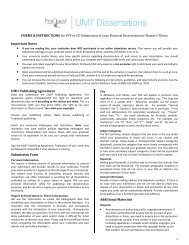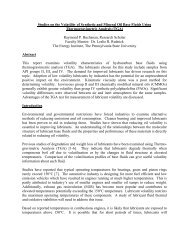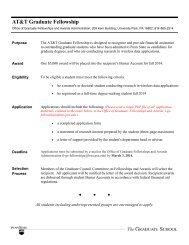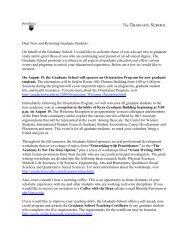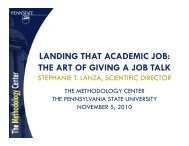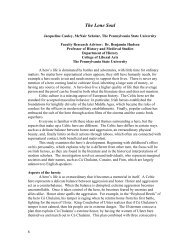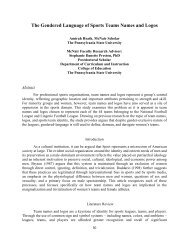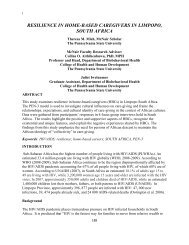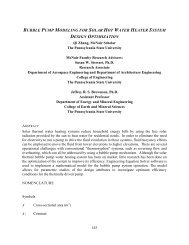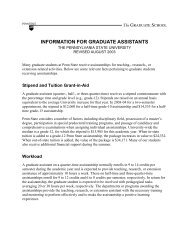1 GRADUATE COUNCIL MEETING 18 January 2012 102 Kern ...
1 GRADUATE COUNCIL MEETING 18 January 2012 102 Kern ...
1 GRADUATE COUNCIL MEETING 18 January 2012 102 Kern ...
You also want an ePaper? Increase the reach of your titles
YUMPU automatically turns print PDFs into web optimized ePapers that Google loves.
Steven J. Schiff, M.D., Ph.D. (Duke School of Medicine) Brush Chair Professor of Engineering in the Department of Engineering Science<br />
and Mechanics; Professor of Neurosurgery and Physics; Director, Center for Neural Engineering<br />
Albert E. Segall (Penn State) Professor of Engineering Science and Mechanics<br />
Vladimir V. Semak, Ph.D. (Moscow Inst of Physics and Tech) Senior Research Associate; Associate Professor of Engineering Science and<br />
Mechanics<br />
Barbara A. Shaw, Ph.D. (Johns Hopkins) Professor of Engineering Science and Mechanics<br />
Elzbieta Sikora, Ph.D. (Polish Academy of Science) Research Associate<br />
Ivica Smid, Ph.D. (U Vienna) Associate Professor of Engineering Science and Mechanics<br />
Samia A. Suliman, Ph.D. (Penn State) Assistant Professor of Engineering Science and Mechanics<br />
Bernhard R. Tittmann, Ph.D. (California, Los Angeles) Schell Professor of Engineering Science and Mechanics<br />
Judith A. Todd, Ph.D. (Cambridge) Department Head; P. B. Breneman Chair and Professor of Engineering Science and Mechanics<br />
Mirna Urquidi-Macdonald, Ph.D. (U Paris, Sud) Professor of Engineering Science and Mechanics<br />
Eduard Ventsel, D.Sc. (Moscow Civil Engineering Inst) Professor of Engineering Science and Mechanics<br />
Jian Xu, Ph.D. (Michigan) Associate Professor of Engineering Science and Mechanics; Adjunct Professor of Electrical Engineering<br />
Sam Y. Zamrik, Ph.D. (Penn State) Professor Emeritus of Engineering Mechanics<br />
Sulin Zhang, Ph.D. (Illinois, Urbana-Champaign) Assistant Professor of Engineering Science and Mechanics<br />
Opportunity for graduate studies are available in interdisciplinary and multidisciplinary research areas including: biomechanics;<br />
composite materials; continuum mechanics; electrical, magnetic, electromagnetic, optical, thermal, and mechanical properties of thin<br />
films; experimental mechanics; lithography; MEMS and MOEMS; micromechanics; molecular beam epitaxy; numerical methods;<br />
photovoltaic materials and devices; nanotechnology and nanobiotechnology; properties of materials; shock, vibration acoustics and<br />
nonlinear dynamics; structural health monitoring; structural mechanics; wave-material interaction; non-destructive evaluation and<br />
testing; and failure analysis.<br />
Opportunities for graduate studies are available in interdisciplinary and multidisciplinary research areas including:<br />
bionanotechnology, biophotonics, and neural engineering in addition to advanced materials, electromagnetics, nanotechnology,<br />
and mechanics. Specifically, research is being conducted on topics such as: biomechanics; composite materials; continuum<br />
mechanics; electrical, magnetic, electromagnetic, optical, thermal, and mechanical properties of thin films; experimental mechanics;<br />
lithography; MEMS and MOEMS; micromechanics; molecular beam epitaxy; numerical methods; photovoltaic materials and devices;<br />
nanotechnology and nanobiotechnology; properties of materials; shock, vibration acoustics and nonlinear dynamics; structural health<br />
monitoring; structural mechanics; wave-material interaction; non-destructive evaluation and testing; and, failure analysis.<br />
Admission Requirements<br />
Page C13<br />
The minimum departmental requirements for admission to graduate standing include a baccalaureate degree from an approved<br />
institution, either in an accredited engineering curriculum or in some other program in mathematics, physical sciences, or engineering<br />
science. For regular admission, the student's grade-point average in the junior and senior undergraduate years must be 3.00 or better.<br />
Graduate Record Examinations (GRE) Aptitude Test scores must also be submitted. International students are required to submit<br />
TOEFL scores as well.<br />
For admission to the Graduate School, an applicant must hold either (1) a bachelor's degree from a U.S. regionally accredited<br />
institution or (2) a postsecondary degree that is equivalent to a U.S. baccalaureate degree earned from an officially recognized<br />
degree-granting international institution. Graduates in engineering, the sciences, mathematics, engineering science, and materials<br />
who present a 3.00 grade-point average, will be considered for admission. Exceptions to the minimum 3.00 grade-point average may<br />
be made for students with special backgrounds, abilities, and interests. Applicants will be accepted up to the number of places<br />
available for new students.<br />
Scores from the Graduate Record Examination (GRE) are required for admission. At the discretion of the Graduate Officer, a student<br />
may be granted provisional admission pending receipt of acceptable GRE scores.<br />
International applicants must take and submit scores for the TOEFL (Test of English as a Foreign Language) or the IELTS<br />
(International English Language Testing System). The minimum composite score for the IELTS is 6.5. The minimum score accepted<br />
for the paper-based TOEFL is 550; 80 (total) for the internet-based test (iBT), with a 19 on the speaking section. Applicants with iBT<br />
speaking scores between 15 and <strong>18</strong> may be considered for provisional admission, which requires an institutional test of English<br />
proficiency and, if necessary, remedial course work.<br />
International applicants who have received a baccalaureate or a graduate degree from a college/university/institution in the following<br />
countries are exempt from the TOEFL/IELTS requirement: Australia, Belize, British Caribbean and British West Indies, Canada<br />
(except Quebec), England, Guyana, Republic of Ireland, Liberia, New Zealand, Northern Ireland, Scotland, the United States, and<br />
Wales.<br />
M. Eng. (E MCH) Degree Requirements<br />
At least 30 graduate credits must be earned, of which 22 must be from lecture/laboratory courses approved by the department.<br />
Fifteen credits must be earned from E SC or E MCH courses as follows: 3 credits are required in the area of Analysis; 3 credits<br />
in the area of Fields; 3 credits in the area of Motion; 3 credits in the areas of Materials Performance/Reliability or Materials<br />
Processing/Structure/Characterization; and 3 credits from any one of the four categories. Additionally, 1 credit of graduate seminar<br />
(E SC 514 or MCH 514) must be earned. A scholarly written report on a developmental study involving at least one area represented<br />
13



